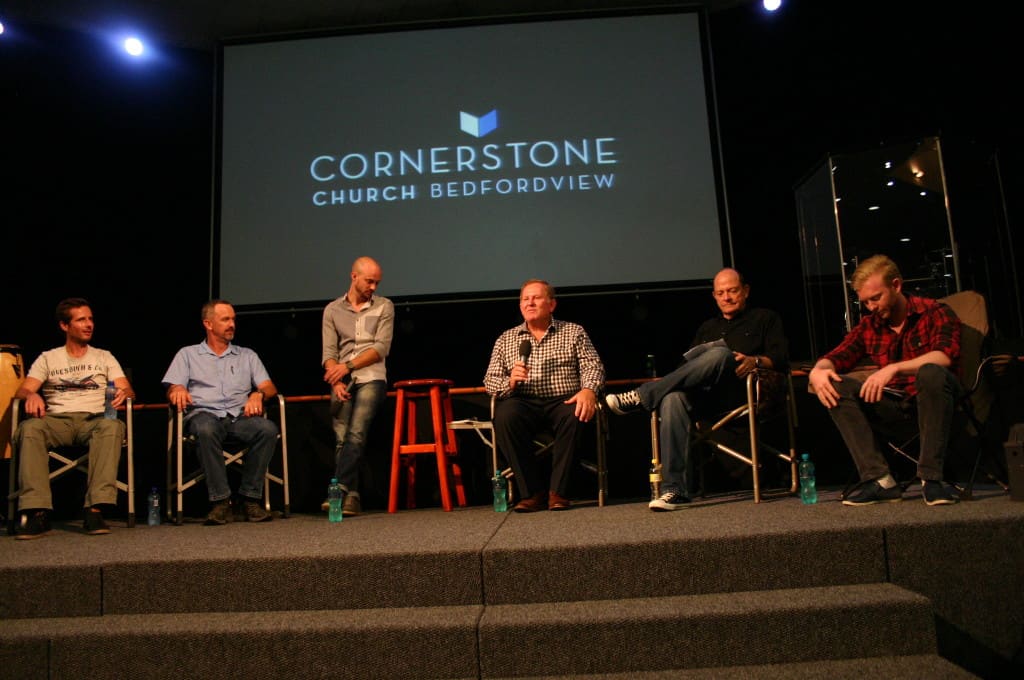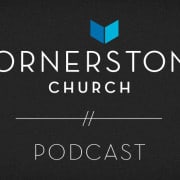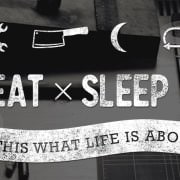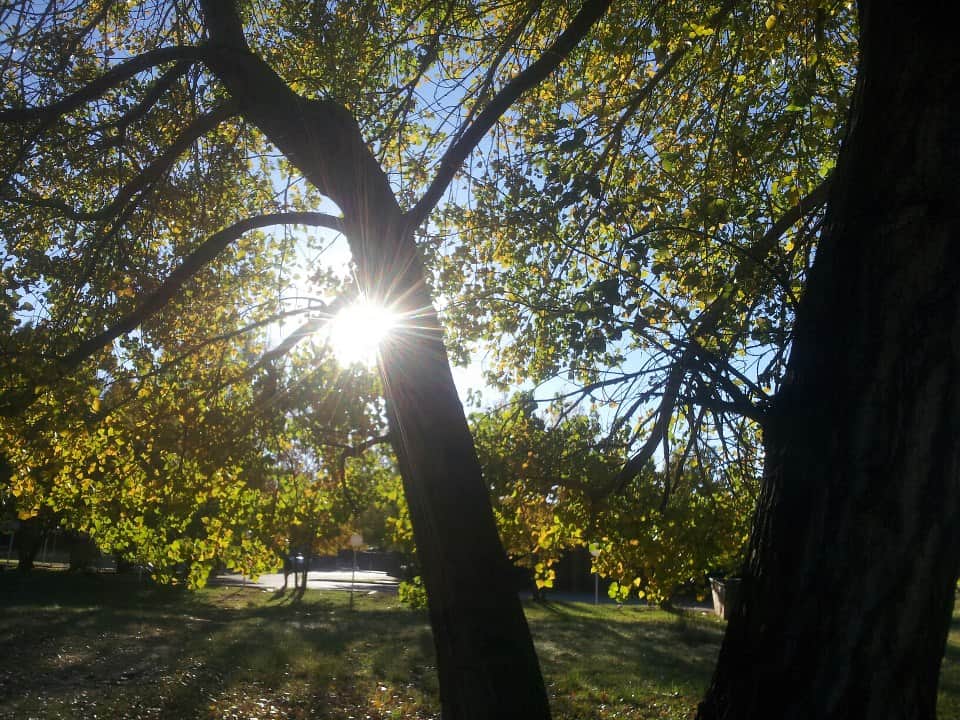Tag Archive for: Ryan Peter
Wanting to Respond to the Call
 by Ryan Peter
by Ryan Peter
We had a hugely encouraging time with Hennie Keyter and his motley crew on Sunday night as they shared with us their stories, struggles, and joys of living out the apostolic call of God. I couldn’t help coming away and feeling that, even if I’m not as tough as Hennie, God has a plan and purpose for us all and, perhaps, I just need to “get over myself” and go for it.
Hennie launched his book His Call, My All at the event. Janet Batchelor has been reading the book and here’s what she thinks:
“His Call, My All” has inspired me about God’s call for our lives in a very big way. As you read it you start saying to yourself, “I want to have a heart like that.” Hennie reflects on many things in this book – and you get to know him, find out more of his background, and how he met Rita and led his family – but one thing that comes up again and again is God’s goodness and that if you trust God, He comes through. Through all the stories Hennie relates in this book – and it’s been a gripping read – you see the Lord honour Hennie’s determination for the apostolic call in the most amazing situations. Doors open as a result and the Gospel can spread further. I know that anyone who reads this book will, at the end, want to go fulfil God’s purposes for them.
All Those Sins are Washed Away
by Ryan Peter

One of the hardest things to believe in Christianity is that, quite simply, all our sins are forgiven and washed away through simply asking God to forgive us.
We complicate this endlessly. But the Bible is emphatic — our sins are washed away by the blood of the Lamb.
If they are washed away when you become a Christian, they are washed away as you live as a Christian.
Listen to this: THEY ARE WASHED AWAY. If you sin and sin and sin and sin constantly, doing the same thing, these are WASHED AWAY by the Blood of the Lamb. You can sin now and ask for forgiveness and then sin in the next moment and then ask for forgiveness. God doesn’t count your sins, He washes them away. We count them. He doesn’t. When God looks at you He sees you as righteous because you are in Christ.
Your sins are washed away. Washed away, washed away, washed away.
It’s so hard to really believe it, isn’t it? We want to constantly add conditions. Are you sorry enough for your sins? Are you determined to stop doing them? Did you repent properly? Did you do all the acts of penance correctly?
The promise is that Jesus washes away our sins if we ask. It’s really simple. When I first decided to believe in Christ I asked God to forgive me of my sins and he did so. I didn’t have to worry about all this other stuff. I simply repented and that was that. Why should I have to worry about it now?
His mercies are new each morning. His steadfast love never fails. (Lamentations 3:22, 23.)
Originally published at ryanpeterwrites.com
We Plough, We Plant; God Sends the Rain
By Ryan Peter
Psalm 65 (NET)
1 For the music director; a psalm of David, a song.
Praise awaits you, O God, in Zion.
Vows made to you are fulfilled.
2 You hear prayers;
all people approach you.
3 Our record of sins overwhelms me,
but you forgive our acts of rebellion.
4 How blessed is the one whom you choose,
and allow to live in your palace courts.
May we be satisfied with the good things of your house –
your holy palace.
5 You answer our prayers by performing awesome acts of deliverance,
O God, our saviour.
All the ends of the earth trust in you,
as well as those living across the wide seas.
6 You created the mountains by your power,
and demonstrated your strength.
7 You calm the raging seas
and their roaring waves,
as well as the commotion made by the nations.
8 Even those living in the most remote areas are awestruck by your acts;
you cause those living in the east and west to praise you.
9 You visit the earth and give it rain;
you make it rich and fertile
with overflowing streams full of water.
You provide grain for them,
for you prepare the earth to yield its crops.
10 You saturate its furrows,
and soak its ploughed ground.
With rain showers you soften its soil,
and make its crops grow.
11 You crown the year with your good blessings,
and you leave abundance in your wake.
12 The pastures in the wilderness glisten with moisture,
and the hills are clothed with joy.
13 The meadows are clothed with sheep,
and the valleys are covered with grain.
They shout joyfully, yes, they sing.
Many of us are going through tough times financially. It feels as if this has been a long season of financial strain. But through this time, God has done some amazing things in our hearts, bringing us closer to him and closer to understanding what’s really important to him and how he really works.
This weekend, God led me to this Psalm. I love the imagery in it – how, after God’s rain, the pastures glisten with moisture, the hills are clothed with joy, and all the valleys and sheep sing for joy, because God’s provision has come.
It’s quite funny that despite all of our technology and our culture which believes that we, as mankind, can really do anything we put our minds to, we’re actually hugely dependent on the earth doing what it was created to do. We still need rain to fill our dams, water our crops, and therefore provide us our food. In the city we perhaps don’t think of such things, but farmers will be thinking of such things all the time. At the most basic level, a farmer will plough the ground, plant the seed and then wait for rain to water it so that it can grow.
This principle is true in our lives of business and work as well, and even our Christian lives of holiness. With all the books and competing philosophies out there, and the general culture of human arrogance, we forget that it’s actually God who sends the rain and makes our businesses / work life grow. This isn’t a superstitious belief, it’s a simple law of nature. If God decides that tomorrow the rain won’t come, we’re in big trouble.
Sacrificing to the gods of this world
All the books and philosophies out there are bent on telling us how we must not only plough and plant when it comes to our work life, but make it rain as well. And if you can’t make it rain, if you can’t even make it grow, then you’re not smart or good enough. But even the world needs God to send rain.
It reminds me of what we know from ancient times – farmers would sacrifice to the necessary gods to send rain. Baal was one of these gods (and you’ll see that Baal pops up quite often in the Old Testament). In modern times, our little sacrifices to the systems of this world to make it rain and see our businesses or careers grow are much the same. We work longer hours than is probably necessary; we spend less time with our family; we spend less time with our church; we’re spending much less time in the presence of God that we can actually really afford to; we’re answering emails at midnight from our phones; we’re reading some new article on how to be a success; and we’re constantly going back to our fields and ploughing and planting again, in case maybe we did it wrong, because God has still not sent the rain.
Not that working hard or even working late (when appropriate) is all that bad. But, if most of us are honest, we often do such things out of fear that the rain won’t come. God isn’t sending the rain and what if he never does? So maybe if I sacrifice a little to some other god, just a little, I’ll be able to cover all my bases.
We do the same with our Christian lives as well, transforming what was a gospel of freedom into a gospel of works. Making our disciplines in the Christian life the formula that will bring fruitfulness, rather than realising it’s the Spirit who produces fruitfulness (Galatians 5) and our disciplines are nothing more than ways to get us to walk in the Spirit.
When it’s God’s provision, there is joy, as the Psalm shows us. When God produces the fruit, there is abundance. There is peace. The trouble is that all these little sacrifices to the so-called gods of provision send drizzles now and then. It works, kind-of. We’ll take the little drizzles though, because that seems better than nothing. But things don’t grow as they’re supposed to and all we do is tire ourselves out.
“Unless the Lord builds the house the labourers labour in vain.” (Psalm 127). “Not by might nor by power, but by my Spirit,” says the Lord in Zecheriah 4:6. It’s not a matter of us just waiting patiently for the Lord to send the rain, but it’s a matter of us entering into worship so that we will live by the Spirit and then the Lord will send the rain. As counter-productive as that may seem. We can’t rely on human wisdom to see fruitfulness in our businesses, careers or Christian walk. We need the wisdom from the Lord. As crazy as it may seem, an hour in the Lord’s presence will bring real rain and fruitfulness, rather than us using the time we should be spending unto the Lord to answer that “important” email or work on that new proposal. The email can wait, we need the Spirit to go about our work every day in a fruitful way. Time spent in the Lord’s presence is never a waste, although the world will disagree. After all, its gods and the sacrifices to its gods are much more easier to manage – you don’t have to walk in a relationship, listen to the Spirit, and action what God says in obedience. You just need to follow the formula.
Blessing for all
In this time, God has challenged me to get into his presence and find that he will send the rain – both on my own financial struggles and the fruitfulness in my Christian character, life and holiness. This Psalm has been a great encouragement for me to remember that God will send the rain, by His Spirit, in the right season, and the result will be joy -“You crown the year with good blessings and leave abundance in your wake.”
Taking the last few verses of this Psalm into mind, when God sends his rain (and He will), our businesses will glisten with moisture, there will be enough provision, and all will shout for joy. The great thing about the imagery here is the rain is not just for us, but for all. God sends his rain down and blesses all. When he blesses us, we are to bless others, so that all may shout with joy and glorify God. And joy can be ours now, in Christ, as we worship Him and make Him our all in all, our number one treasure, and not our bank accounts, possessions, our status, or even our ability to provide.
Music is “Creation” Too
This last Sunday I was commissioned to lead the music and singing for South Side and I arrived somewhat early – which was all fair and well for me as it gave me some time to reflect and enjoy the wonderful Autumn morning. I sat by a tree (pictured above) and enjoyed its yellow-orange leaves shower over me, while the sun warmed me up and the chirping of the many birds all around were my soundtrack.
This is the kind of guy I am. I love nature. Creation. Sunrises and falling leaves and blossoms and mysterious, starlit evenings. It’s moments like this when my heart lights up in gratitude and worship. When my restless body finally gets what it needs to settle down – beautiful views, sounds and smells. When my voice shuts up and a greater voice speaks.
I thought to myself, “Now, if only I could bring this creation – all this beauty – into our morning worship.”
Then it hit me. Well, music is also a part of God’s own creation! I’m doing just that!
It seems to me that I’m often distracted by the sheer business of music. Most of my music ‘career’ has been about cool bands and cool hair. Thankfully I grew out of that several years ago. But even still, getting the music right for a Sunday morning; choosing the right songs; working on the dynamics of those songs; keeping up with trends; making sure I get all the cues right… all this business of music makes me forget the beauty of music in itself, its very nature, the fact that God created this stuff. I didn’t invent this. Playing music is, indeed, God-glorifying – it works toward this end just like all of creation works toward this end.
As the heavens tell of the glory of God (Psalm 19:1) so music tells of the glory of God. That’s if we’d let it. If we would get the business of it out of the way – the preferences of style, taste, and skill.
I do believe that sometimes we rely too much on music in church to make ‘things happen’ (whatever that may mean). I do believe that the lyrical content of much of our modern church music is pretty lame and sometimes even damaging to people’s relationship with God. But I have to admit, when sounds and notes go together, the very nature of that… the very nature of music… tells the glory of God. And that makes music joyful for me again, because when eternity comes, we’re really not going to care at all about the business of music. And that’s why we fill our church meeting places with these notes and the sounds of voices that echo the many facets and many stories of a relationship with the same person, Jesus Christ.
You Think Idolatry is Not a Problem?
I must admit that when the SEX, MONEY, POWER series was first announced I thought to myself, “That’s awesome. A lot of guys struggle with these things. And this is going to be a really good series for them.”
But I was in for a surprise. This series highlighted some major – an unexpected – things in my own life. It wasn’t just about ‘them’. It was a challenge for me in a big way.
I first realised this when my wife and I we were discussing how we were going to address the subject of sex in our Life Group, coming off the back of that Sunday morning’s message. It’s a difficult one, of course, given that our Life Group has guys and girls, singles and couples, and even children. How would we talk about this subject in such a mixed setting?
A key text in the Old Testament came out in our discussion – the story of the Golden Calf in Exodus 32. Here it is (NIV):
The Golden Calf
32 When the people saw that Moses was so long in coming down from the mountain, they gathered around Aaron and said, “Come, make us gods who will go before us. As for this fellow Moses who brought us up out of Egypt, we don’t know what has happened to him.”
2 Aaron answered them, “Take off the gold earrings that your wives, your sons and your daughters are wearing, and bring them to me.” 3 So all the people took off their earrings and brought them to Aaron. 4 He took what they handed him and made it into an idol cast in the shape of a calf, fashioning it with a tool. Then they said, “These are your gods,[b] Israel, who brought you up out of Egypt.”
5 When Aaron saw this, he built an altar in front of the calf and announced, “Tomorrow there will be a festival to the Lord.” 6 So the next day the people rose early and sacrificed burnt offerings and presented fellowship offerings. Afterward they sat down to eat and drink and got up to indulge in revelry.
7 Then the Lord said to Moses, “Go down, because your people, whom you brought up out of Egypt, have become corrupt. 8 They have been quick to turn away from what I commanded them and have made themselves an idol cast in the shape of a calf. They have bowed down to it and sacrificed to it and have said, ‘These are your gods, Israel, who brought you up out of Egypt.’
9 “I have seen these people,” the Lord said to Moses, “and they are a stiff-necked people. 10 Now leave me alone so that my anger may burn against them and that I may destroy them. Then I will make you into a great nation.”
11 But Moses sought the favor of the Lord his God. “Lord,” he said, “why should your anger burn against your people, whom you brought out of Egypt with great power and a mighty hand? 12 Why should the Egyptians say, ‘It was with evil intent that he brought them out, to kill them in the mountains and to wipe them off the face of the earth’? Turn from your fierce anger; relent and do not bring disaster on your people. 13 Remember your servants Abraham, Isaac and Israel, to whom you swore by your own self: ‘I will make your descendants as numerous as the stars in the sky and I will give your descendants all this land I promised them, and it will be their inheritance forever.’” 14 Then the Lord relented and did not bring on his people the disaster he had threatened.
15 Moses turned and went down the mountain with the two tablets of the covenant law in his hands. They were inscribed on both sides, front and back. 16 The tablets were the work of God; the writing was the writing of God, engraved on the tablets.
17 When Joshua heard the noise of the people shouting, he said to Moses, “There is the sound of war in the camp.”
18 Moses replied:
“It is not the sound of victory,
it is not the sound of defeat;
it is the sound of singing that I hear.”
19 When Moses approached the camp and saw the calf and the dancing, his anger burned and he threw the tablets out of his hands, breaking them to pieces at the foot of the mountain. 20 And he took the calf the people had made and burned it in the fire; then he ground it to powder, scattered it on the water and made the Israelites drink it.
21 He said to Aaron, “What did these people do to you, that you led them into such great sin?”
22 “Do not be angry, my lord,” Aaron answered. “You know how prone these people are to evil. 23 They said to me, ‘Make us gods who will go before us. As for this fellow Moses who brought us up out of Egypt, we don’t know what has happened to him.’ 24 So I told them, ‘Whoever has any gold jewelry, take it off.’ Then they gave me the gold, and I threw it into the fire, and out came this calf!”
What a strange and rather hilarious thing for Aaron to say: “out came this calf!” As if the idol appeared out of nowhere.
After this event they begin to make the temple and various giftings are poured out (see Exodus 36). Also, God brings His presence. It seems that God needs to deal with idolatry in our lives before he pours out His presence in greater abundance and, as a result, pours out his gifts.
You might recall Mike Hanchett’s prophetic word over Cornerstone from a few weeks back. In it there was a lot around God’s presence and His gifts being poured out over our church. It may be that before God brings this prophetic word to fruition many of us need to deal with idols that have crept in. I know this is certainly the case in my life.
When Shannon explained some of this to me I felt God say, “Ah,” and he began highlighting certain things in my own life that I’ve been largely ignoring or just living with. Certain things that, like Aaron, I’ve been saying, “Well, it just appeared out of nowhere!” But the truth is, that’s simply not so.
Yesterday was the last of this series, POWER, and I was challenged again on the idolatry issue. There are some key points from Marcus’ notes from yesterday that I think are worth mentioning:
- Idols demands your attention
- Idols keep you pre-occupied
- They dominate
- And idol becomes a priority of your time, talents and treasures
- Idols become those things we constantly run to for comfort and salvation
- We hold them in high value – they captivate us
But, the real story is
- They cannot redeem us, satisfy that deep need for a relationship and provide a future hope for us. They are not our saviour
- They are deceptive
- They need us to survive, no matter what kind of idol
- They bring us into bondage/slavery, not freedom
- They bring destruction to our lives and the lives of those around us
For me, there are many things I actually do run to for comfort and salvation. Many things. But what I had never seen before was how these things, as the third last point says above, need me to survive. Often it feels as if I need them to survive. Isn’t that deceptive? Without me, idols have no life – after all, as Marcus said, an idol requires me to polish it, me to fashion it, me to keep it safe. It needs me. That’s been a brilliant revelation.
It’s been a really great series and has fitted in very well with where we are as a church right now, I believe. Or, at the very least, it’s been great for me. Check out all the resources below on this series:
SEX (Week 1: 28 October)
MONEY (Week 2: 4 November)
POWER (Week 3: 11 November)
MEN LEAD: Health and Fitness
The MEN evening last night was fantastic, with a focus on Health and Fitness. Lots of guys were getting into it and enjoying it, with testosterone flying around left, right and centre.
There were a few challenges to do – for example, Crossfit had a few competitions going where guys had to see how many push-ups, clean and jerks or squats they could do in 30 seconds, while Mixed Martial Arts (MMA) experts were showing how the sport works and running competitions where guys could check how many punches they could do in a minute, etc.
Meanwhile, men could also get their blood pressure checked and have some quick blood tests done, while guys could try out some health food and grab some free vitamins. In short, there was a ton of things to see and do. There was even some hip-hop dancing going down.
Marcus spoke about family, marriage and singleness – being a husband, being a father and then being a single guy. One of the Crossfit guys, who used to be a bouncer (and was involved with everything that usually comes with that lifestyle) gave his testimony on how Jesus has changed everything for him.
Marcus’ talk included this spoken word video below, which is worth a watch! I love the last line: “You don’t fall out of love as much as you fall out of repentance.”
Next weekend’s MEN LEAD event will incorporate the outdoors and all the gadgets and things we can get relating to that sort of lifestyle. If the past events are anything to go by, this one is going to be great!
What’s Easter About Anyway?
Contrary to popular belief that Easter (an Old English word for ‘Passover’) is all about chocolate, eggs and bunnies, Easter is celebrated by Christians as a time that represents the death and resurrection of Jesus Christ.
It would be impossible to delve into all the details of these two events and what they mean in such a short space. But phrases such as “Jesus died for your sins” or “he was raised on the third day” often become clichés that bear no meaning for many people.
So what do these phrases really mean? Their meaning is multi-faceted and often very difficult to grasp unless we really know who Jesus was and how he lived his life. All of that has been recorded in the Bible books of Matthew, Mark Luke and John, and anyone interested in Christianity should start there.
In short, Jesus ‘died for our sins’ on Good Friday by taking them upon himself when he, as an innocent man who brought healing to others, underwent a torturous and unjust death nailed to a Roman instrument of capital punishment – a wooden cross. Justice declares that all of us, one way or another, ought to pay for the wrong things (sin) we have done to each other and even to ourselves. In effect, death is our punishment. But Jesus took the punishment of death upon himself in our place and was raised to life three days later on the Sunday (Easter Sunday) after He himself had conquered death.
By taking the punishment upon himself we no longer have to face what justice requires. Instead, we can go free – live forgiven, restored, in peace and in healing. By being raised to life Jesus declares that he has conquered death and that all who trust in Him live in his victory. In other words, we move from death into life, not death into death, when we trust Jesus. And all it takes is a simple decision to do so!
When Jesus insisted that those who were murdering him and mankind should not suffer justice but be forgiven (Luke 23:34) he ushered in a new order (Kingdom) of grace, mercy and peace. No longer does mankind need to live under an order where wrong must be put right through punishment, but now mankind can live in an order of grace and mercy where wrong is put right through love. This is how the Christian endeavours to live – just as Jesus lived.
There’s more. Jesus gives Christians his Holy Spirit, who is also God, and who lives in Christians, empowering them to live a life of love and grace; empowering them to bring God’s healing, restoration and reconciliation to the world.
And it all boils down to that pinnacle moment – Easter Sunday – when what God will do in the future – raise us up to life – was brought into the present.
The promise of God’s grace, mercy, peace and restoration is open to anyone and everyone. It doesn’t matter who you are and what you’ve done, when you trust in Jesus your sins are completely wiped away.
That’s why we celebrate Easter.







